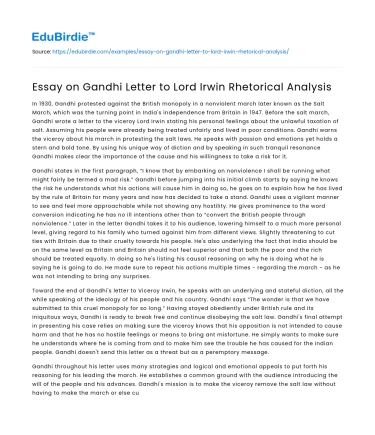In 1930, Gandhi protested against the British monopoly in a nonviolent march later known as the Salt March, which was the turning point in India's independence from Britain in 1947. Before the salt march, Gandhi wrote a letter to the viceroy Lord Irwin stating his personal feelings about the unlawful taxation of salt. Assuming his people were already being treated unfairly and lived in poor conditions. Gandhi warns the viceroy about his march in protesting the salt laws. He speaks with passion and emotions yet holds a stern and bold tone. By using his unique way of diction and by speaking in such tranquil resonance Gandhi makes clear the importance of the cause and his willingness to take a risk for it.
Gandhi states in the first paragraph, “I know that by embarking on nonviolence I shall be running what might fairly be termed a mad risk.” Gandhi before jumping into his initial climb starts by saying he knows the risk he understands what his actions will cause him in doing so, he goes on to explain how he has lived by the rule of Britain for many years and now has decided to take a stand. Gandhi uses a vigilant manner to see and feel more approachable while not showing any hostility. He gives prominence to the word conversion indicating he has no ill intentions other than to “convert the British people through nonviolence.” Later in the letter Gandhi takes it to his audience, lowering himself to a much more personal level, giving regard to his family who turned against him from different views. Slightly threatening to cut ties with Britain due to their cruelty towards his people. He's also underlying the fact that India should be on the same level as Britain and Britain should not feel superior and that both the poor and the rich should be treated equally. In doing so he's listing his causal reasoning on why he is doing what he is saying he is going to do. He made sure to repeat his actions multiple times - regarding the march - as he was not intending to bring any surprises.
Save your time!
We can take care of your essay
- Proper editing and formatting
- Free revision, title page, and bibliography
- Flexible prices and money-back guarantee
Toward the end of Gandhi's letter to Viceroy Irwin, he speaks with an underlying and stateful diction, all the while speaking of the ideology of his people and his country. Gandhi says “The wonder is that we have submitted to this cruel monopoly for so long.” Having stayed obediently under British rule and its iniquitous ways, Gandhi is ready to break free and continue disobeying the salt law. Gandhi's final attempt in presenting his case relies on making sure the viceroy knows that his opposition is not intended to cause harm and that he has no hostile feelings or means to bring ant misfortune. He simply wants to make sure he understands where he is coming from and to make him see the trouble he has caused for the indian people. Gandhi doesn't send this letter as a threat but as a peremptory message.
Gandhi throughout his letter uses many strategies and logical and emotional appeals to put forth his reasoning for his leading the march. He establishes a common ground with the audience introducing the will of the people and his advances. Gandhi's mission is to make the viceroy remove the salt law without having to make the march or else cut all ties with Britain. It is not a threat as Gandhi makes clear but to show how Britain and India are much more of the same and to maintain possibly a future relationship between the two with India as an independent country.
Did you like this example?
Make sure you submit a unique essay
Our writers will provide you with an essay sample written from scratch: any topic, any deadline, any instructions.
Cite this paper
-
APA
-
MLA
-
Harvard
-
Vancouver
Essay on Gandhi Letter to Lord Irwin Rhetorical Analysis.
(2024, February 29). Edubirdie. Retrieved November 21, 2024, from https://edubirdie.com/examples/essay-on-gandhi-letter-to-lord-irwin-rhetorical-analysis/
“Essay on Gandhi Letter to Lord Irwin Rhetorical Analysis.” Edubirdie, 29 Feb. 2024, edubirdie.com/examples/essay-on-gandhi-letter-to-lord-irwin-rhetorical-analysis/
Essay on Gandhi Letter to Lord Irwin Rhetorical Analysis. [online].
Available at: <https://edubirdie.com/examples/essay-on-gandhi-letter-to-lord-irwin-rhetorical-analysis/> [Accessed 21 Nov. 2024].
Essay on Gandhi Letter to Lord Irwin Rhetorical Analysis [Internet]. Edubirdie.
2024 Feb 29 [cited 2024 Nov 21].
Available from: https://edubirdie.com/examples/essay-on-gandhi-letter-to-lord-irwin-rhetorical-analysis/
copy






 Stuck on your essay?
Stuck on your essay?

